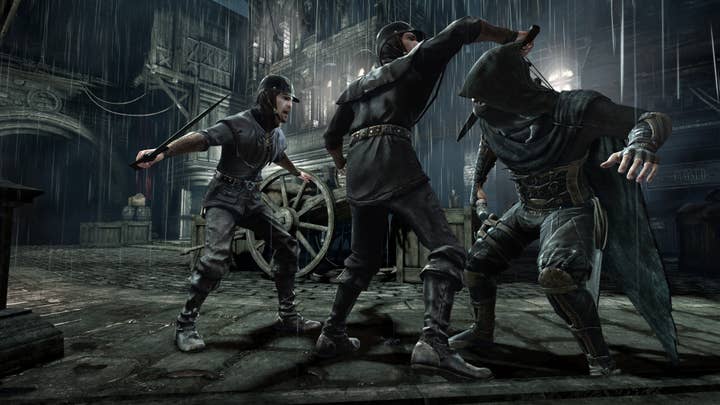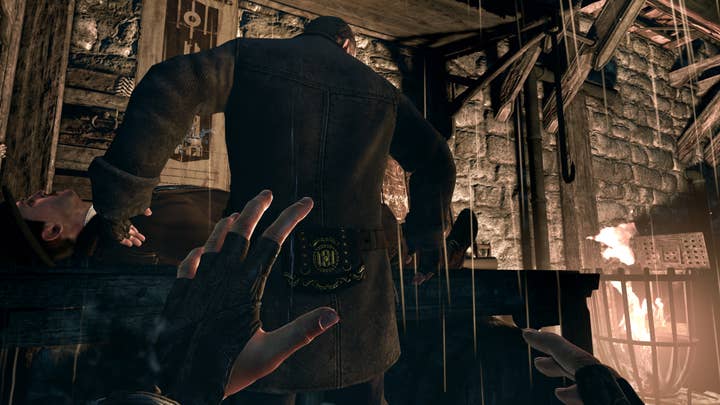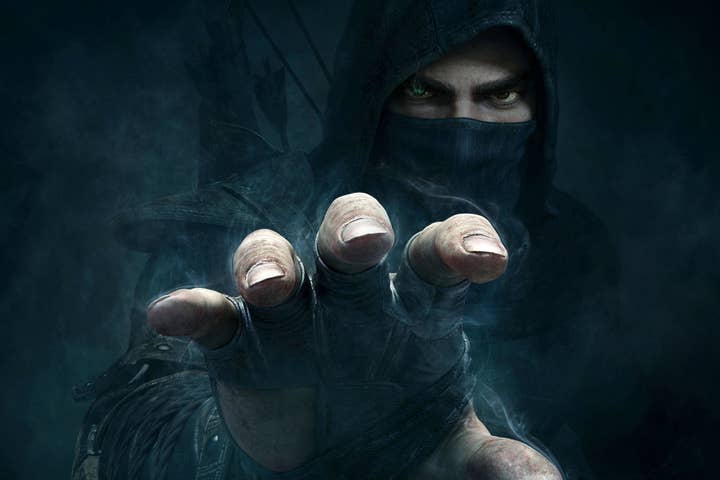Critical Consensus: Thief struggles with its ancestry
After a long period of development, just what does the press expect from the reboot of a design classic?
The weight of expectation drags heavily upon Eidos Montreal's Thief. After its successful overhaul of another of gaming's creative touchstones, Deus Ex, one would think that it had earned the benefit of the doubt, but it takes a great sloshing pot of goodwill to combat the destructive spectre of a 'troubled development'.
Not only was Eidos Montreal taking a multi-million dollar swing at a franchise that was more revered than bought even in its original incarnation, the notion that it wasn't doing a particularly good job of that daunting task has been flaunting around since the middle of 2012. Great games have been sired in protracted development cycles marred by high-profile departures, but that's not the conventional wisdom. For many in the games press, Thief was a disaster waiting to be unleashed before the preview code even landed on their desks.
"The plot is a derisory digest of trends in contemporary stealth gaming, from Human Revolution to Splinter Cell to Dishonored"
The Daily Telegraph
The Daily Telegraph's Tim Martin may or may not have been among those with such a calcified take on Thief's prospects, but he had few kind words to offer the final product. Indeed, his two-star review - one of the lowest scores the game received - even opens with an admission that, "I mustn't think about the Thief games from the Nineties," such was his reverence for the series', "strange [mixture] of control and disempowerment, precision and paranoia."
"In fairness, too, New Thief seems keen to get players to thrust old Thief from their minds. Aside from the names of a couple of characters, there is very little here to make you feel that you're playing a Thief game rather than, I don't know, Powercut Parkour: Emo Edition or Palace of Westminster Burgling Sim 2013. The reboot wholly abandons the baroque mythology of the original series... Instead, the plot is a derisory digest of trends in contemporary stealth gaming, from Human Revolution to Splinter Cell to Dishonored: amnesiac protagonist, reluctant hero, city-wide plague, mysterious energy, lockpicking, sneaking around in air vents and all.
"The very basic ideas - navigate a faux-medieval city, blackjacking guards, picking locks and stealing loot - are still here. But even the roster of slidable difficulty options can't conceal the fact that this game has been designed for a very low denominator indeed... Where its predecessors aspired to be 'immersive sims', forcing you to read large open environments and experiment to proceed, the new game boasts a cramped sequence of discrete levels, punctuated by long loading screens, where the player is assailed by a kind of omnipresent visual nagging: walk here, crawl here, jump here, sneak here. Options to go off-piste are grimly limited."

If Martin isn't exactly alone in identifying the derivative ideas and nannyish features scattered throughout Thief's design, he is certainly more surprised than most at their inclusion. Like Deus Ex and System Shock, Thief: The Dark Project is a totem for a specific way of designing and playing games, but it is also very much an artefact of its time. As Eurogamer's Simon Parkin points out in his 6 out of 10 review - which, it's worth pointing out, reels off a very similar list of complaints to Martin's critique - the nature of high-end game development has, "changed a great deal since 1998." The idea may not appeal to the nostalgic gamer, but in some sense a big-budget remake of Thief had to be different.
"Video games of this kind of breadth and ambition cost a great deal more to make these days, for one thing. It's a financial pressure that has brought the original game's designs into closer alignment with current fashions... So the cobbled, rat-piss-stained streets of The City act as a hub from which Garrett heads out into chaptered missions; these carefully funnel him down corridors of gameplay which offer little capacity for diverse approaches.
"The sense of historical place is broken by guards that speak in a range of unlikely accents, and who endlessly complain about how much they long for a cup of coffee"
Eurogamer
"Often a mission builds to a crescendo in which you flee a collapsing building or try to outsprint wildfire in a Call of Duty-esque, summer-blockbuster choreographed sprint. Thief's familiar props are present - rope arrows that can be fired to create routes to new areas; glimmering gold wall plaques put up by the council that can be unscrewed and lifted; glow-eyed zombies with dripping fingers - but they're joined by a raft of new imports designed to broaden the game's appeal."
Parkin seems less concerned with the way Eidos Montreal departs from the template established in The Dark Project, and more about the uneven execution and "thoughtless" design choices evident in a game that took five years to create. The sheer volume and variety of trinkets for Garrett to steal is overwhelming, for example, making the player feel, "more like a diligent cleaner than a master thief." In some extreme examples, the spell created by the game's atmospheric environments is shattered by some bizarrely anachronistic dialogue.
"The sense of historical place is immediately broken by guards that speak in a range of unlikely accents from Texan to Aussie, and who endlessly complain about how much they long for a cup of coffee. The scriptwriting also fails to find a coherent voice or tone. (In one early scene you watch a guard plunge a dagger into a corpse's stomach to remove a swallowed ring. After the amateur surgeon leaves, another guard, having been chastised for missing the valuable when he first searched the body, comments: 'You don't suppose we should be checking for cock-rings and stuff?')"
Parkin finished his review with a nod to the new high-watermark in the sub-genre Thief helped to define: Arkane's Dishonored, a game with few issues when it comes to coherence and consistency. Polygon's Arthur Gies explores a similar idea in his 6 out of 10 review, accusing Eidos Montreal of covering too many bases, adding too many features to the mix without sufficiently developing its strongest ideas. For one thing, the game's mechanics create a "basic and pretty satisfying loop" in which sticking to the shadows and knowing when to flee and regroup are the only sure way to achieve your goals - particularly in the game's more open hub-world. "Eidos Montreal does a great job of teaching you that you absolutely do not want to get caught," he notes.

"It's in the city that Garrett most feels like the creature he's always been: a compulsive thief in search of the next score, big or small. But, for whatever reason, Thief is much more interested in throwing Garrett into a dark conspiracy involving an ancient artifact that will do... Well. Stuff, I suppose.
"It's never really clear what the people using the artifact intend to do with it, other than an omnipresent mostly vague sense of 'bad things'. The main 'bad thing' the artifact is responsible for is a poorly developed plot that shoves Garrett into objectives that don't revolve around stealing as much as possible.
"This version of Thief covets the satisfaction of an object well stolen, and brings its trim hero to life in a way that the original games never quite touched on"
Joystiq
"There are occasional, refreshing sections of Thief that sit, open and waiting to be explored... But these parts set me up for disappointment when Thief slipped the leash back on... The loop that began as a satisfying exercise becomes more and more frayed. In the latter half of the game, when a glimpse of that openness was dangled in front of me once again, Thief snatched it away with murderous AI and controls that didn't feel up to the challenge. The result is a game that doesn't ever fully come together."
That's the seldom spoken reality of expectations: every individual's will be slightly different, but they often feel like absolute requirements for success. What, exactly, a reboot of Thief in 2014 is supposed to be is perhaps a less relevant question that what each player expects it to do. For Joystiq's Ludwig Keitzmann, who awarded Thief an impressive 8 out of 10, that is rather simpler than many other reviews make it appear. With noticeably less hand-wringing over its fidelity to the original incarnation, Keitzmann explains Eidos Montreal's success in a vital area. Indeed, there's a clue in the title.
"This version of Thief covets the satisfaction of an object well stolen, and brings its trim hero to life in a way that the original games never quite touched on. This Garret extends his fingers in anticipation, grips the corners that help obscure him, and caresses a shelf of dusty books, feeling out the mark of a secret passage. He pinches his lockpicks with finesse, wiggling them ever so slightly when the placement is right. You're seeing - in first-person - the well-mannered hands of a master, and before long they trick you into playing like one.
"Thief excels as a lean stealth game, even if you ignore Garrett's fancy arrows and strip it down to just the essentials of hiding, plotting a quiet path and swooping through the light. In the open city - tragically segmented by loading breaks - you set your own goals and feel rewarded by your own cunning... In its subtle moments, Eidos Montreal gives your creeping a sense of closeness and texture, in a game where you almost always have your nose pressed against things. Much like Garrett, Thief succeeds when it's quiet, fingers reaching out and almost - almost - touching an irresistible spread of glittering prizes."

